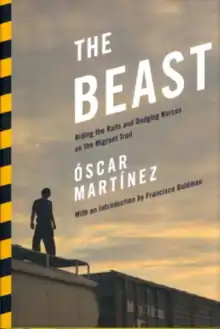 | |
| Author | Óscar Martínez |
|---|---|
| Original title | Los migrantes que no importan |
| Translators | Daniela Maria Ugaz John B. Washington |
| Language | English |
| Subject | El tren de la muerte |
| Publisher | Verso Books[1] |
| Media type | |
| Pages | 267[1] |
| ISBN | 9781781682975 |
The Beast: Riding the Rails and Dodging Narcos on the Migrant Trail is the first book by Salvadoran journalist Óscar Martínez.[2] The book was originally published in Spanish in 2010 as Los migrantes que no importan (The Migrants that Don't Matter). It was translated into English in 2013 by Daniela Maria Ugaz and John B. Washington. The book follows the harsh journey of Central American immigrants on the El tren de la muerte to the United States.[1][2][3][4]
Background

Martinez works as a journalist for El Faro. He spent a year travelling with the migrants across Mexico along with a crew of photographers and filmmakers and made eight trips aboard the freight trains on the El tren de la muerte. The book is a compilation of a series of stories published in the newspaper. The book was first published in 2010 by Icaria and El Faro and a second edition was released by Mexican publishers sur+ Ediciones in 2012. The English translation was published by Verso Books and has an introduction by Francisco Goldman.[3][5][6][7]
Reception
The book was met with largely positive reviews. The Guardian called it a 'gale-force book' and appreciated the 'raw authenticity' of the prose.[8] The New York Times felt that the title change from the Spanish version was to 'subtly shift the emphasis to the train and away from its reluctant passengers' and felt that the translation takes away some of the 'sizzle of the original'. They however lauded the 'graceful, incisive writing' and called it an honorable successor to The Road to Wigan Pier by George Orwell and How the Other Half Lives by Jacob Riis.[1] The Economist drew parallels with Joan Didion's book Salvador while also appreciating the translation work.[9] Financial Times lauded the 'precise, empathetic and often poetic language' of the writer which 'summons rage and pity but also admiration in the reader'.[10]
Martinez won the WOLA-Duke book award for The Beast in 2014. He also won the CPJ International Press Freedom Awards in 2016.[11]
References
- 1 2 3 4 Rohter, Larry (17 December 2013). "Clinging to a Monster in a Desperate Gambit". The New York Times. Archived from the original on 4 July 2015. Retrieved 7 June 2017.
- 1 2 Maslin, Sarah Esther (11 April 2016). "Life and Death Among the Gangs of Central America". The New Republic. Archived from the original on 23 May 2017. Retrieved 7 June 2017.
- 1 2 "Los migrantes que no importan by Óscar Martínez". Americas Quarterly. Archived from the original on 31 October 2015. Retrieved 7 June 2017.
- ↑ "Review: The Beast, By Óscar Martínez". The Independent. 18 October 2013. Archived from the original on 28 September 2015. Retrieved 7 June 2017.
- ↑ "Questions For Oscar Martinez, Author Of 'The Beast'". NPR. Archived from the original on 25 October 2016. Retrieved 7 June 2017.
- ↑ "Q&A with Oscar Martinez, Author of 'The Beast'". The Texas Observer. 17 October 2013. Archived from the original on 11 October 2016. Retrieved 7 June 2017.
- ↑ "Dialogue with Journalist Óscar Martínez, Author of The Beast: Riding the Rails and Dodging Narcos on the Migrant Trail". University of Arizona. Retrieved 7 June 2017.
- ↑ Vulliamy, Ed (29 December 2013). "The Beast by Oscar Martínez; Midnight in Mexico by Alfredo Corchado – reviews". The Guardian. Archived from the original on 13 October 2015. Retrieved 7 June 2017.
- ↑ "Beastly business". The Economist. Archived from the original on 17 November 2016. Retrieved 7 June 2017.
- ↑ "Hope and peril on Mexico's border". Financial Times. November 2013. Retrieved 7 June 2017.
- ↑ "Óscar Martínez, El Salvador". Committee to Protect Journalists. Archived from the original on 20 June 2017. Retrieved 7 June 2017.